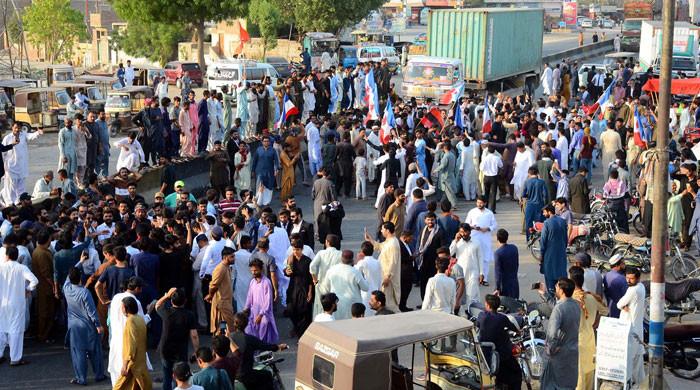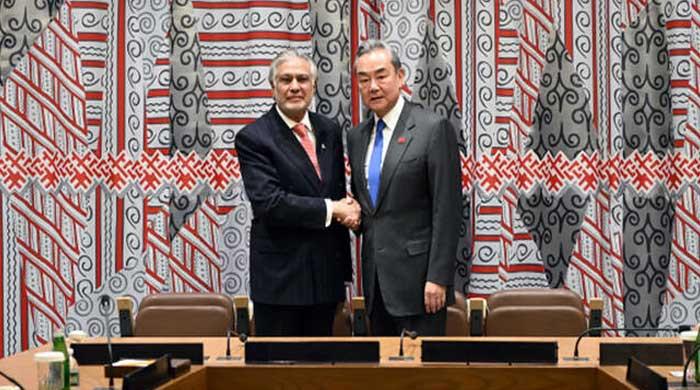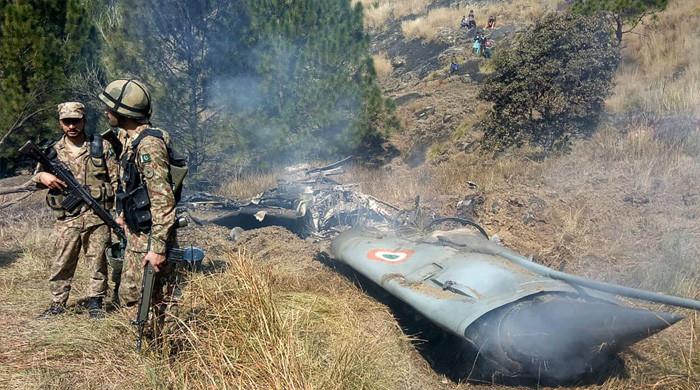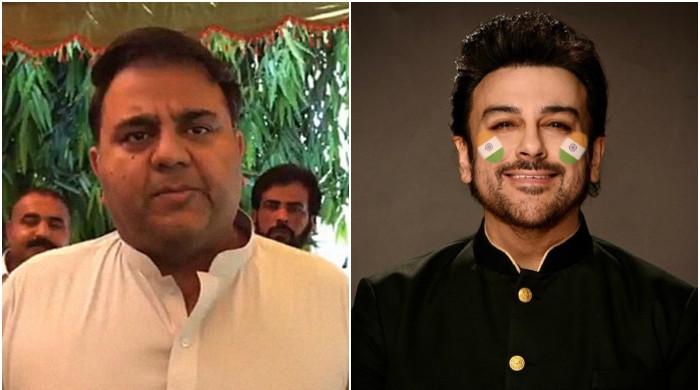'All we want is 'a cleaner and safer' future': Karachi gears up for Climate March
Educators dejected by how youth unaware about climate change.
September 20, 2019
In 1994, little Haniya was first introduced to global warming — then a term that few people knew in Pakistan and ever fewer actually took seriously — her eyes widening in shock as she realised what the future would be like if no action was taken.
But it's not the 1990s anymore and neither is global warming just a term; it has rather evolved to give birth to what the world is experiencing — a climate emergency.
Now 36, Haniya is ever so determined as she was back then to fix what capitalism, ignorance, and indifference has created. Leading everyone like a paternal figure, she is already gearing up for the Climate March in Karachi. "We are in the midst of a climate crisis!
"I’m walking because it’s time we all stood collectively and demanded an end to the corporate greed and government complacency that has led us to this predicament," says Haniya, who successfully runs Project Kamyabi, a social enterprise that works with marginalised women artisans to create upcycled, or eco-friendly, bags from discarded, less valuable items.
She tells Geo.tv: "The Climate March in Karachi aims to amplify the voices of those suffering from climate injustice and galvanise the residents to demand legislative action on the climate crisis now."
The urgency of the climate cause is further highlighted by the fact that many children in Pakistan are not even aware of the problem. According to a young educator who teaches teenagers, when he informed his students about the Climate March Karachi, their responses ranged from ‘What is climate change?’ and ‘Why is it our concern?’ to ‘A protest for such an insignificant thing?’ and ‘Why are telling us about it right now when the march is later?’.
The educator said he felt dejected by how Pakistan’s youth was so depressingly unaware about climate change.
A majority of the Pakistani people, at least at a glance, are no different, it seems. The country is a potpourri of weather — Karachi heats up like an oven, Lahore's rains go on for days, Peshawar and the north experience frigid cold, Islamabad's scenic beauty lacks humidity, and Quetta remains dry and rocky. Yet, the common man would only comment, at most, on how the weather has worsened or the mercury's highs and lows have spaced out.
The reality, albeit in infancy and akin to a child forced to mature faster after the birth of a sibling, may be different. Earlier this month, when I joined a WhatsApp group dedicated to the climate change cause and active in organising the March in Karachi, I was blown away by how the climate change movement had spread like a wildfire (pun unintended).
Scroll down for a checklist for Climate March Karachi
Articles upon articles, stories followed by more crucial ones, and researches on how the climate crisis will impact Pakistan were being shared by members of that group. And it's not just a few cities; the emergency has come a-knocking for the whole country.
Environmentalist Eric Shahzar, who often writes for leading publications, explains that our glaciers are melting at an unprecedented rate, the droughts intensifying, and seas acidifying with methane plumes rising up from the ocean floor.
"All this is happening decades ahead of scientific projections. It is now time to take climate change more seriously than ever," stresses Shahzar.
It's not as easy a task, regardless, considering how, despite having set up the world's first proper Ministry of Climate Change, Pakistan is still meandering through — apparently leaderless — since the dedicated minister has in the past made praised the country's premier for ruling so well that god has started to send "good rains and snow" and recently allegedly praised the Italians' skin after a delegation from Rome visited Islamabad.
Actor Ali Rehman Khan also tweeted on the issue, urging Karachi residents to march today for a cleaner and greener Pakistan.
Afia Salam, a freelance environmental journalist who is "marching in solidarity with the global movement initiated by Greta Thunberg" emphasises on how Karachi needs to heed this dire calamity's warning.
Salam has been one of the critical voices in the movement, attending awareness-building sessions, participating in mobilisation drives, and reaching out — alongside other prominent climate activists like Basil Andrews and Abira Ashfaq — to the communities and villages with lack of resources, such as the fisherfolk residing in the coastal areas.
"As a Pakistani, I need to make people aware of the threat we face from climate change and the urgent need to take actions. [Plus,] Karachi is a city directly impacted by climate change and the march will serve to raise awareness about the urgent need to address it," she notes.
Bismah, a 19-year-old non-binary person from Karachi who did not prefer to disclose their last name, tells Geo.tv about conditions in Karachi. "The water at Seaview is polluted and so are the beaches," they say. "There is literally medical waste at the Clifton beach."
They lament how "Pakistan is a polluted country and the only people that will actually work to make it better are the civilians". There's "burning of garbage, factory deposits, and smoking" in the country, they highlight.
Maybe, the climate change leaders in Karachi hope, the March would jolt those in power to take action since the Pakistani port city's politicians leaders have been busy slinging mud and responsibilities at each other, engaging in publicity stunts on social media, and refusing to budge from the seats they have learned to love.
It came as an embarrassing surprise when the Karachi Metropolitan Corporation (KMC) cancelled an "adoption agreement" of a three-acre plot owned and being developed by Shahzad Qureshi, who leads the Urban Forest initiative in the country's economic hub. After multiple people raised their voice on social media and a protest held at the soon-to-be urban forest, it was restored.
Political gimmicks such as these leave Karachi a hostage to leaders who prefer engaging in a war of words.
Mikael, a 15-year-old student, remarks that he is worried about how there is still a lack of discourse on the climate crisis. "Climate change is an issue not talked about enough and it should be an issue better addressed," he says.
However, not all is lost as today's Climate March will hopefully prove.
Young adults such as Wajih, 22, an environmental consultant, remain confident, saying even the basic public awareness about climate change and the environmental crisis would be helpful. "It's high time that this issue is made known to every single person so that they can think and work on it like on any other issue," he says.
Nationwide, the marches in 33 Pakistani cities are demanding that climate change be declared an emergency, work be started through a global coalition, adoption of a low-carbon economy, and ensuring grassroots-level climate adaptation efforts.
For Karachi, on the other hand, the demands expand to include a revision in the Karachi Master Plan to address the climate crisis, launching an afforestation project to increase green cover, regulation and reduction of emissions, and establishing of an urban waste management program.
Bismah, the 19-year-old Karachiite who has already packed the essentials for today's march, says they will make sure the voice of the youth is heard. Their determination unwavering, they say that Pakistan needs to reduce the amount of plastic it uses and disposes and create a proper recycling system, they comment, vowing that they will "get our demands to reduce waste met".
The March will "draw attention to all these factors as they are contributing to the entire world as well," they underscore.
All we want is "a cleaner and safer country, with reduced wastage".
Climate March Karachi checklist
• Use carpool or ride-hailing apps to reduce emissions
• Bring hats and multiuse (not plastic) water bottles; STAY HYDRATED!
• Wear flat, comfortable shoes
• Do not litter the venue; everyone will help clean up after the March
• Smoking is not allowed; keep cigarettes, their smoke, and filters away
• Please do not damage plants or property











